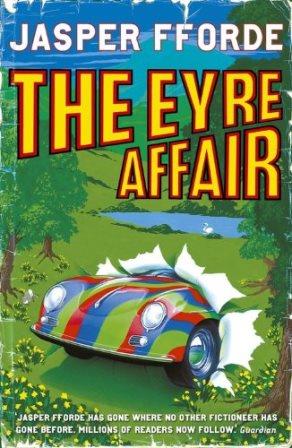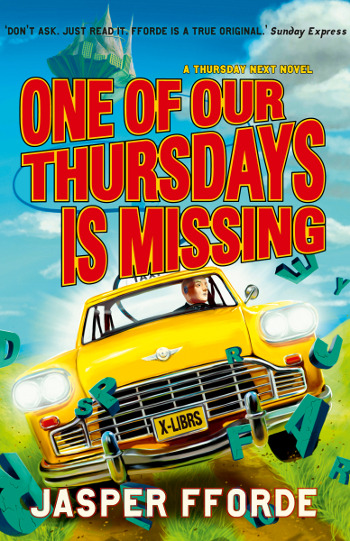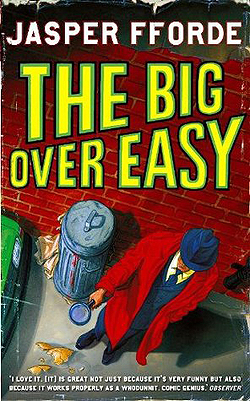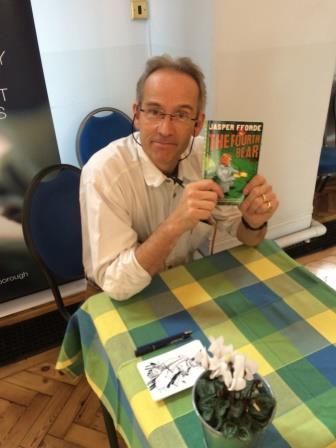
The only thing I love more than books are books about other books.
Jasper Fforde obviously shares my feelings; he has created two series with a distinctive literary bent, one following the adventures of Literary Detective Thursday Next, the other called ‘The Nursery Crimes’. Both involve the intermingling of fictional and, er, differently fictional characters. ‘The Eyre Affair’ is Fforde’s debut novel and the first in his Thursday Next series.
What’s it about?
In an alternative 1985, the Crimean war never ended, literature is incredibly popular and Acheron Hades, super villain, is kidnapping characters from major works of fiction to hold them for ransom. Thursday Next, experienced Special Operations officer and owner of a version 1.2 Dodo, has sworn to prevent crimes against literature. Plus, Hades was once her literature professor so she can identify him to more senior officers. While trying to rescue Jane, destroy Hades and halt the Crimean war, can she also persuade ex-fiancé Landen Park-Laine to marry her and work out who actually wrote Shakespeare’s plays?
What’s it like?
It’s both ridiculous and delightful, often at once. Fforde creates a world that is strikingly similar and dissimilar to our own: Wales is a slightly hostile Republic, information is available on both a need-to-know and who-you-know basis, and young boys swap cards with literary characters rather than than Pokemon. Taken on one level, this is is simply an enjoyably daft story; on another level it serves excellent satire, mixing high and low-brow humour in a Monty Pythonesque manner.
This is a treasure trove of literary allusions for the bookish.
Key players in the book include the Goliath Corporation: a mega company with fingers in every pie – including defence contracts – who wield great power in governmental decisions, often from key (unelected) advisory roles. Hmm. Sound at all familiar? Their main representative is called Jack Schitt. Yes, it’s very childish. And yes, he is a bit. Fforde isn’t done having fun. A very minor character who works in the LiteraTec department is called Paige Turner. If this sort of thing irritates you, Fforde’s mix of the sophisticated and the just plain mad might not work for you. It’s not my preferred type of humour, but there’s plenty more to ‘The Eyre Affair’.
Most obviously, this is a treasure trove of literary allusions for the bookish. Instead of being bothered by Jehovah’s Witnesses, Thursday is door stepped by a Baconite: fans of Francis Bacon who believe he wrote the plays attributed to Shakespeare and feel compelled to spread the word. This commitment makes perfect sense in a world where, rather than place coins into pop machines in diners, pedestrians can pop their pennies into Will-Speak machines to hear extracts from the Bard’s plays declaimed aloud.
Fforde has been justly compared to Lewis Carroll, Douglas Adams and George Orwell, and shades of all these fine writers are present.
At the crux of it all, of course, is Jane Eyre. It’s tempting to think that a familiarity with Brontë’s original text would be helpful here, but it’s really not necessary. In a rather obvious ploy (although this can’t be considered a criticism in such a ‘meta’ text) Thursday explains the plot to a fellow LiteraTec who has never quite found the time to read it. There’s subsequently a lovely twist, but it’s open to all readers, even those with no knowledge of the original text, if they’ve been paying attention to the role played by Thursday’s father, a ChronoGuard whose face can stop a clock (yes, this book also involves time travel). I am very familiar with ‘Jane Eyre’ which meant I gained perhaps an extra frisson of enjoyment from the whole scenario – ooh, that’s Mr Rochester! – but I really don’t think ignorance would be a great hindrance here.
A minor discordant note for me was Thursday’s relationship with her ex-fiancé Landen. I just didn’t care. I don’t think Fforde really expects you to care either; it just gives him a convenient way to give the book a structured conclusion. Personally, I’d rather there was more literary daring-do and a touch less romance, especially because it seems we can’t have books with strong central female characters who just aren’t interested in men and marriage. That said, the Landen-Thursday thread is just one of many and I’m sure most readers would find it mildly sweet.
Final thoughts
Fforde has been justly compared to Lewis Carroll, Douglas Adams and George Orwell, and shades of all these fine writers are present. His originality is at once childish and sophisticated, fun and clever. I have read this book several times since I first bought it and it is equally good each time, perhaps because vaguely remembering the plot doesn’t detract in the slightest from the ingenuity of the style. A bit like sugar, a little madcap fun can go a long way, and it might be easier to retain a sense of amusement if the book is read a few chapters at a time, rather than devouring it in one sitting. Highly recommended.
‘The Eyre Affair’
Jasper Fforde
Hodder, 2001, paperback
My reviews of a selection of Fforde’s other books can be found here:



1 Comment
Shall have to check it out. You had me at “version 1.2 Dodo!”